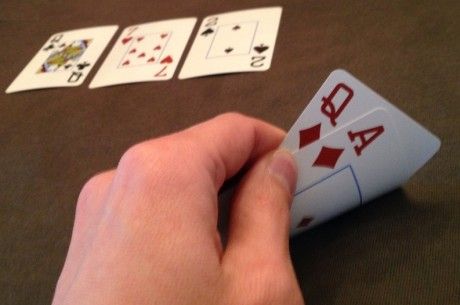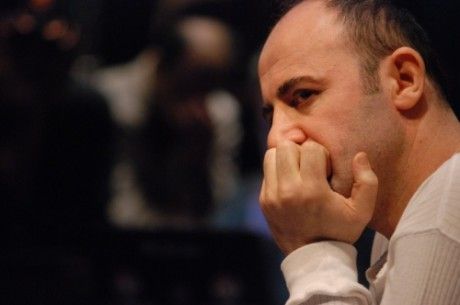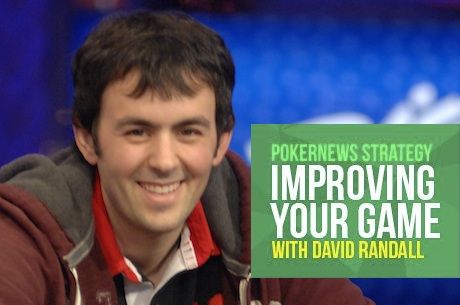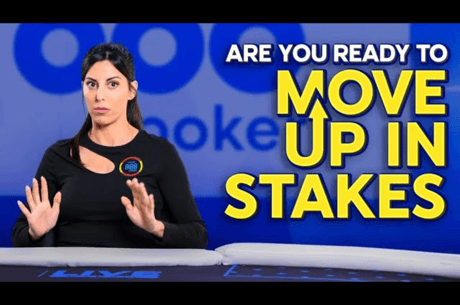Thinking Poker: Getting Full Value from Strong Hands
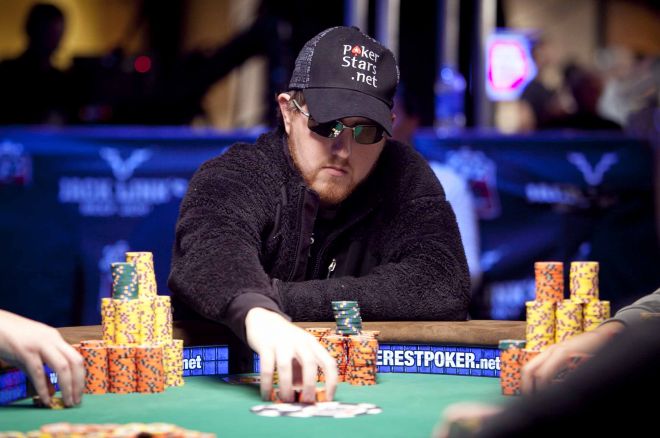
I��d just taken a seat in a $5/$10 no-limit hold��em game, and although I��d witnessed fewer than a single orbit��s worth of play, it seemed like I��d found a good one.
The player on my right had been involved in four of the six pots I had seen, generally with passive limping and calling behavior though he��d had one pretty blatant river bluff picked off.
He��d also shrugged and paid off what seemed like a pretty obvious value bet. Both during and after the call, his demeanor said, ��What can I do?�� �� an attitude often exhibited by players who feel compelled to go to showdown with hands of a certain strength (top pair is one common candidate).
I hesitate even to give this read, because although it made the correct play in the hand I��m about to relate even more apparent, I think my play would be correct even without such a read.
Three players, including the one on my right, limped for $10. I was on the button with K?K? and raised to $60. The first limper and the seemingly loose player on my right both called and everyone else folded, so we went to the flop three-handed with $205 in the pot. These players had about $1,500 each in front of them, and I covered them both.
The flop was Q?9?2?. My opponents checked to me, and I bet $100. There��s a case to be made for betting larger with this hand, but I like to keep my continuation bets consistent. In other words, I try to bet the same percentage of the pot in a given situation, taking into account factors such as position and board texture but not my cards.
Later in the hand, when I have a better idea of what my opponents have, I��m more willing to make exploitive plays, playing their cards as much as my own. Continuation betting is a situation that comes up so often that I prefer not to give my opponents the opportunity to pick up on patterns in my play.
Both players called, and with $485 in the pot, we saw a 6? turn. The first player checked, and the player on my right took the lead, betting $200.
With good reason, many players are reluctant to play big pots with one pair, but sometimes the situation simply calls for it. Here with my kings, everything argues for a raise. It��s quite difficult for anyone to have a hand better than mine. AxAx and QxQx would almost certainly raise preflop, and 9x9x probably would as well. Meanwhile 6x6x would probably fold the flop, and 2x2x might raise.
The biggest threats, then, are Qx9x and 9x6x, and while I can��t rule those out, the mere possibility of encountering a better hand should not deter you. It is far more likely that these players have straight draws, flush draws, or worse one-pair hands, and against all of those you��d prefer to raise. Losing a big pot to the occasional two-pair hand is just the cost of doing business.
Another concern that deters some people from raising here with kings is the threat of a reraise. Although I agree that this would give you a difficult decision, it��s quite unlikely. For one thing, it ought to be very difficult for anyone to raise you, because your range is the least capped and the most likely to contain very strong hands like QxQx, 9x9x, AxAx, and KxKx.
On top of that, most people, especially those who limp preflop, are also excessively passive. You can expect them to be at least as averse to playing a big pot with a marginal hand as you are. Basically, although a raise would put you a tough spot, it��s not something you need to worry about because of how rarely it will come up.
I raised to $500. The first player quickly folded, and the second quickly called. The quick call is another nice bit of information to have, although I think my river play would be the same regardless. It indicates a hand that my opponent never considered folding and never considered raising. Thus it��s now even more unlikely that he has my hand beat. His most likely holding is either a draw or top pair.
That��s not to say the he shouldn��t consider folding or raising either of these. You really ought to consider all options at all times. But when people act very quickly, that��s the sort of hand I expect them to have.
The river was the 9?, making the board Q?9?2?6?9?. That may seem like a bad card, but it makes Qx9x and 9x6x even less likely, and after the turn action, I really was not too concerned about my opponent holding a bare nine.
He checked, making his having a 9x even less likely. I shoved for his last $900 or so, and after a few moments�� thought he called and lost.
There are a lot of situations where it really is a mistake to put 150 big blinds into the pot with an overpair. Ultimately, however, it is situational. Sometimes an overpair is a lot more marginal than other times, depending on how coordinated the board is and how the action has gone so far. Rather than using blunt rules to guide your play, you should think about your opponent��s likely holdings and do your best to make the right decision.
Remember, money not won is worth just as much as money lost, so don��t let a misguided risk aversion keep you from getting full value from your strong hands.
Be sure to listen to Andrew and Nate Meyvis on the Thinking Poker podcast, and for strategy articles, reviews, and more from Andrew, check out the rest of The Thinking Poker website.
Get all the latest PokerNews updates on your social media outlets. Follow us on Twitter and find us on both Facebook and Google+!

